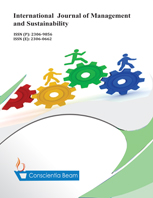Poverty, Inequality and Millennium Development Goals’ Expenditure: A Probabilistic Linkage
DOI:
https://doi.org/10.18488/journal.11/2014.3.11/11.11.653.663Abstract
The objective of this paper is to investigate the linkage between poverty, inequality and Millennium Development Goals’ (MDGs) expenditure. To achieve the set objective, probit and logit models were empirically employed using a panel data series. The results revealed that a unit increase in expenditure on MDGs would lead to increase in poverty by a single digit and income inequality by double digits. This is not to blame the MDG funding or discourage it. Plausibly the expenditure on MDGs has been constrained due to technical, managerial, institutional, macro-economic imbalances, and policy bottlenecks. Therefore, government and agencies should ameliorate these constraints. Consequently, this work has originated applied logit and probit models to explore poverty-inequality-MDGs’ expenditure nexus.

